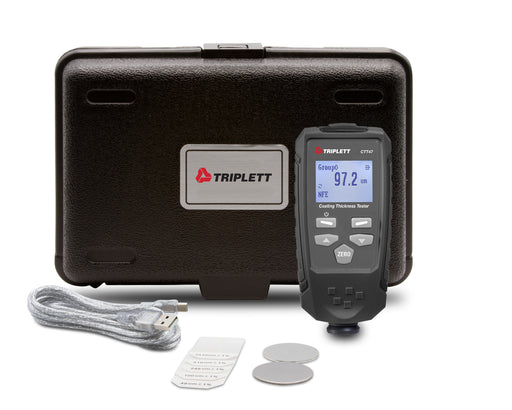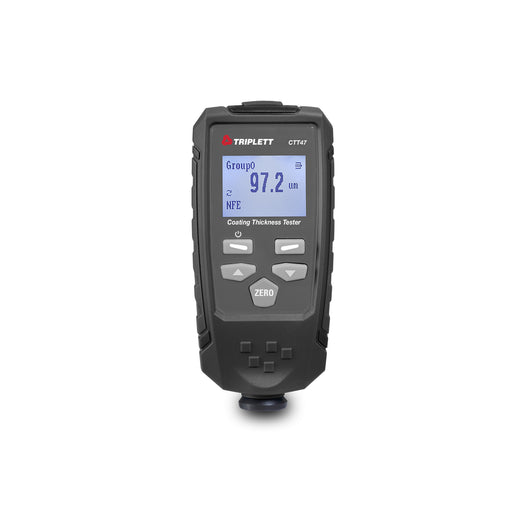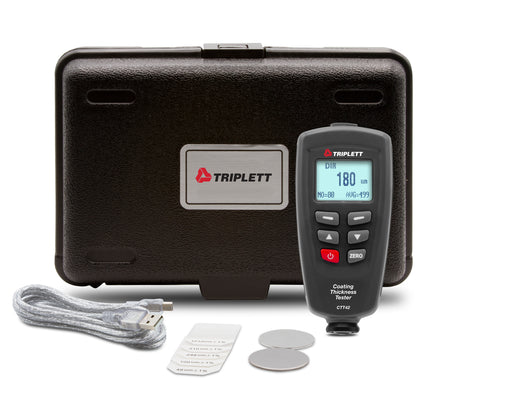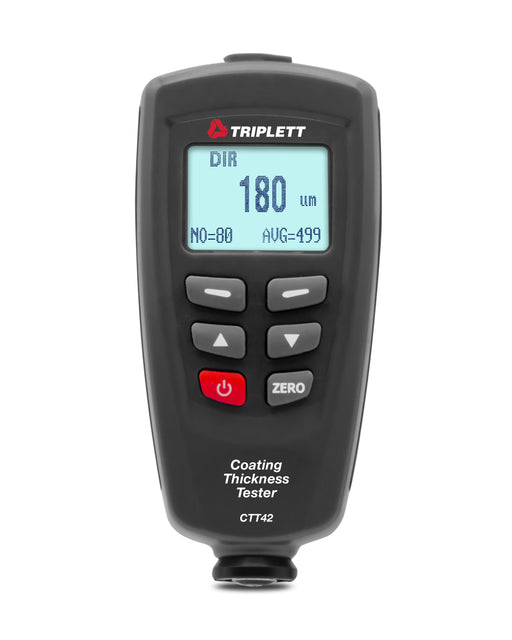Know More About Triplett Coating Thickness Testers
What Does Dry Film Thickness (DFT) Mean?
Dry Film Thickness (DFT) is the measurement of a coating or paint film's thickness once it has undergone the drying and curing process. It is an essential parameter measured across diverse industries such as manufacturing, construction, automotive, and marine applications. Measuring DFT helps ensure the coating's overall quality, adherence to surfaces, and performance characteristics. By accurately measuring the DFT, manufacturers and professionals can verify the coating's compliance with specifications, standards, and customer requirements, ensuring optimal protection and durability of the coated surfaces.
DFT measurement is typically performed using specialized tools called coating thickness gauges. Coating thickness testers determine the thickness of the dried coating. The tester is placed on the coated surface, and the measurement is taken in a non-destructive manner.
Why Measure Dry Film Thickness (Coating Thickness)?
Measuring dry film thickness (coating thickness) is essential for quality control, corrosion protection, performance and durability, cost optimization, regulatory compliance, warranty adherence, and process control. Accurate and consistent measurement ensures that coatings meet desired specifications, leading to reliable and long-lasting protection of the coated products.
Working Principle of Coating Thickness Gauges
Coating thickness gauges, also known as paint thickness gauges or film thickness gauges work based on different principles depending on the type of coating and the gauge technology used. The two most common principles employed by coating thickness gauges are magnetic induction and eddy current. Electromagnetic induction is used for non-magnetic coatings on magnetic substrates, while the eddy current principle is used for non-ferrous substrates. We offer coating thickness testers with USB for automatic recognition of ferrous and non-ferrous substrates. So, these testers can work on both the principles based on the substrate type.
What Are Electromagnetic Induction Coating Thickness Gauges?
These are DFT gauges that measure the coating thickness for non-magnetic coatings on magnetic substrates. Traditionally, a magnet is the main source of an alternating electromagnetic field. In this case, Hall effect is generated to sense the magnetic flux density at the pole. There’s another coiled wire that detects changes in the magnetic flux. Our digital coating thickness gauges when taken near a steel or iron surface measures the changes in magnetic flux. You can calculate coating thickness once you know the magnetic flux. The output is displayed on the screen.
What Are Eddy Current Coating Thickness Gauges?
These thickness gauges can measure in a non-destructive way (NDT), and are used for non-magnetic substrates. These are quite similar to the electromagnetic ones in many ways. An alternating electromagnetic field is produced here as well. When you get the probe near to the conductive surface, the magnetic field creates eddy currents on the surface. The distance of the probe from the surface as well as the substrate properties have an effect on the magnitude of eddy currents, and they produce an opposing magnetic field. This is sensed by the coil to calculate magnetic flux and coating thickness.
Popular Applications of Dry Film Thickness Gauge
There are many applications of dry film thickness gauges such as anodizing and galvanizing procedures used in engineering, electronics, and automotive industries. It is also used in refurbishment of vehicles, machines, equipment, and more. They also find applications in ship building and aircraft industries as well as independent paint shops.
How to Choose a Correct Coating Thickness Tester?
Choosing the correct coating thickness tester, also known as a paint thickness gauge or film thickness gauge, is crucial for accurate and reliable measurements. Here are some key factors to consider when selecting a coating thickness tester:
- Type of Coating and Substrate: Consider the type of coatings you work with and the substrates on which they are applied. Different coating thickness testers are designed for specific types of coatings (e.g., magnetic or non-magnetic) and substrates (e.g., ferrous or non-ferrous metals). Ensure that the tester you choose is compatible with the coatings and substrates you commonly encounter.
- Measurement Range: Evaluate the measurement range of the coating thickness tester. Ensure that it covers the thickness range of the coatings you typically work with.
- Accuracy and Precision: Look for a coating thickness tester that provides accurate and precise measurements. Check the specifications for the instrument's accuracy, typically expressed as a percentage of the measurement value. Consider the required level of accuracy for your specific application and select a gauge that meets those requirements.
- Measurement Method: Coating thickness testers employ different measurement methods, such as magnetic induction or eddy current. Each method has its advantages and limitations depending on the coating and substrate being measured. Consider the suitability of the measurement method for your specific application to ensure accurate and reliable results.
- Probe Size and Design: Evaluate the probe size and design of the coating thickness tester. The probe should be suitable for the size and shape of the coated surface you will be measuring. Ensure that the probe tip or sensor is designed to make proper contact with the surface and provide consistent measurements.
- Display and User Interface: Consider the ease of use and readability of the gauge's display and user interface. A clear and intuitive display with relevant information simplifies the measurement process. Additionally, features like data storage, graphical representations, and user-friendly controls can enhance the usability of the instrument.
- Calibration and Standards: Check the calibration process of the coating thickness tester. Determine whether it requires regular calibration and if there are certified calibration standards available for your specific industry or application. Calibration ensures measurement accuracy and traceability.
- Durability and Portability: Consider the durability and portability of the coating thickness tester. Depending on your application, you may need a rugged instrument that can withstand harsh environments or a portable device that can be easily carried to different work locations.
- Cost: Lastly, consider your budget and the overall value provided by the coating thickness tester. It is important to strike a balance between cost and the features, accuracy, and reliability needed for your specific application.
What Does 'mil' Mean When Measuring Paint Coating Thickness?
Mil means one thousandth of an inch. Paint coat thickness is expressed in mils. While this is more common in the US, in most countries micron is the unit to express thickness.
What is a Good Paint Thickness Reading?
Mostly, paint thickness ranges between 4 and 7 mils as per industry standards. Anything below that may imply partial or full removal of the coat. Anything beyond 7 mils could either be excess or may have done according to custom specifications.
How Accurate Are Paint Thickness Gauges?
Triplett offers some of the most accurate paint thickness gauges that are digital and work in two modes. They have an easy-to-use menu, adjustable backlight, user-programmable high/low alarms, min/max/average, two-point calibration with Zero adjust, measuring modes, and working modes. Aside from this, they have a built-in memory that stores up to 400 readings which can be transferred to a computer via the USB interface. All these features help increase their accuracy as well as lifespan.
Browse More Building, Maintenance & Environmental Collections
Inspection & Laser Distance Meters:
| Industrial Borescope Camera | Photo & Contact Tachometers |
| Manometers | Laser Distance Meters |
Gas Meters:
| Natural Gas Detector and Pen | Formaldahyde Meters | Co & Co2 Meters |
Environmental Meters:
| Sound & Noise Level Meters | Hygro-Thermometers | Non-Contact & Contact Thermometers |
| Handheld Particle Counters | Humidity Indicators & Meters | Light Intensity Meters |
| Vane Anemometers | Digital Hygrometer |
Water Quality:
| PH and Conductivity Meters |




